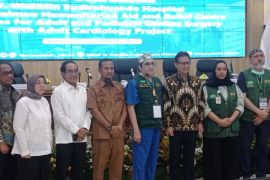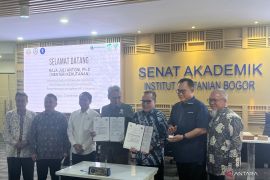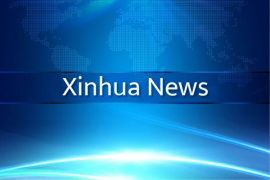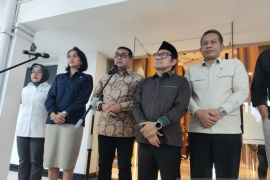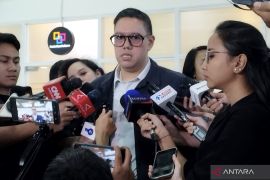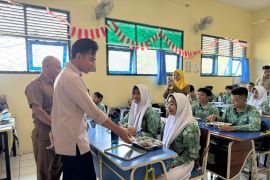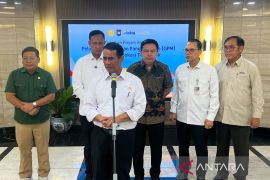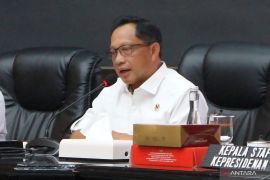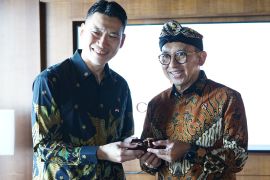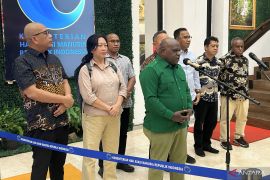A particular issue that needs redressing is the asymmetry of Indonesia-Taiwan economic relations."Jakarta (ANTARA News)- The Indonesia-Taiwan relation has developed a strong foundation now as it is based on both- shared values and interests, allowing the two economies to refocus their cooperation and to optimize opportunities.
It is learnt that there are still plenty of areas that could be improved upon and expanded to reduce asymmetrical problems, and to redesign a comprehensive scheme to be more equal, complementary and mutually beneficial for closer and deeper cooperation.
Taiwan is an old friend and a long-term trading partner of Indonesia. Bilateral relations between Indonesia and Taiwan, which began in the late 1960s, flourished rapidly.
Despite no diplomatic ties between Jakarta and Taipei, non-diplomatic relations between the two economies have developed substantially, in particular in economic relations, trade, agriculture and tourism.
Initially, bilateral relations between Indonesia and Taiwan developed due to a convergence of security outlook and complementary economic interests.
"Anti-communism and the drive for regional stability underpinned the earlier Jakarta-Taiwan cooperation," Prof. Dr. Dewi Fortuna Anwar, Chairwoman of the Institute for Democracy and and Human Rights at The Habibie Center, said recently.
The existence of real economic opportunities has made cooperation both, profitable and sustainable.
Indonesia is rich in natural resources and has a large pool of cheap labour, as well as a big domestic market, while Taiwan is a rapidly developing industrial economy possessing capital and technological advantages. Each has something that the other needs and wants.
"This is perhaps unsurprising given the economic status of each country within its respective region: Indonesia as the largest economy in Southeast Asia and Taiwan as one of the most developed economies in East Asia," said Rahimah Abdulrahim, Executive Director of the Habibie Center.
In past years, notwithstanding the geo-political constraints, the opportunities for widening and deepening bilateral relations between Indonesia and Taiwan have grown.
Taiwan is Indonesia's third largest trading partner behind Japan and China. Trade between the two economies has doubled in past five years, from US$4.1 billion in 2007 to US$10.8 billion in 2011.
In 2011, Taiwan`s investment into Indonesia reached US$243.2 million with 87 projects. Taiwan's investments in Indonesia are mainly in furniture, textile, shoes, non-iron ore, metal products, trade service, agriculture and the forest farming industry.
Taiwan continues to be one of Indonesia's most important investment partners.
Taiwan`s economy continues to grow and restructure and it will always be an important economic partner and friend for Indonesia.
Based on data released by the Center for Political Studies (P2P) LIPI and Taipei-based Chung-Hua Institution for Economic Research last year, Indonesia was Taiwan`s 11th largest trading partner as of 2010 and Taiwan`s 13th largest export market (US$4.47 billion) and 11th largest supplier of imports (US$6.02 billion).
Taiwan has run a trade deficit with Indonesia since 1991 and the deficit peaked at US$3.765 billion in 2008. However, the trade deficit narrowed down to US$1.548 billion in 2010.
There are still plenty of areas that could be improved and expanded, such as strengthening bilateral trade, investments and other forms of economic relations between Indonesia and Taiwan.
"A particular issue that needs redressing is the asymmetry of Indonesia-Taiwan economic relations," Rahimah said.
Previous studies have identified disparities in the areas of technological utilization, management capacities, human resources, access to financial resources, productivity and export capability, all of which overly disadvantages Indonesia.
In light of this, efforts are being made to explore the possibility of a bilateral FTA or economic cooperation agreement (ECA) that would not only redress the aforementioned disparities but also lead Indonesia and Taiwan to enjoy larger benefits from this agreement, that could enlarge their economic sizes and could further economic prosperity for their people.
Although a joint feasibility study on the possibility of a bilateral FTA or ECA is expected to be completed by the end of 2012, the benefits of complimentary partnership dialogues, which are designed via people-to-people channels, should not be underestimated given that they are a useful initial step towards encouraging intensive and comprehensive dialogues between the respective governments.
"The dialogue initiated by Taipei Economic and Trade Office or TETO and The Habibie Center is one example of promising efforts," she said.
The Indonesia-Taiwan Dialogue is a product of years of cooperation between THC and TETO, building upon and reinforcing the strong and successful relations that have been established between Indonesia and Taiwan in a wide range of sectors through non-official and non-diplomatic channels.
THC in collaboration with TETO, Indonesia, and Nanhua University (Taiwan) hosted the 3rd Indonesia-Taiwan Dialogue themed "Indonesia-Taiwan Dialogue: Shared Values and Moving towards an Outward Looking Relation" from September 18-21, 2012 in Taiwan.
Another important area of Taiwanese-Indonesian economic relations is the joint-development project to transform the Indonesian island of Morotai into a Special Economic Zone. For Taiwan, the development project allows them to tap into the abundant natural resources found on the island.
For Indonesia, the development project allows them to make use of Taiwan`s advanced technologies in much needed areas such as infrastructure improvements to its existing air and sea transportation facilities, as well as fully utilizing the island's historical and natural tourism potential by building biotechnological parks, eco-cities and marine ecotourism parks.
According to Rahimah, such a green model for joint development is one that could become a benchmark for the world.
"Moreover, the development project could also be a good starting point for further deals between Indonesia and Taiwan," she said.
Although China, given its proximity and troubled relation with Taiwan, has become more tolerant, it remains to be seen whether this will always be the case, especially with changes in China's leadership about to take place.
The rise of China and the increasingly close relations between China with ASEAN countries, including Indonesia, has created certain challenges in managing relations between Indonesia and Taiwan.
China has become much more vigorous and assertive in ensuring that its regional and international partners strictly adhere to and enforce their respective One China policy. This has, at times, created difficulties for countries that have close relations with both Beijing and Taipei.
This was especially true when relations between Beijing and Taipei were tense. Improvement in Cross Strait relations in the past few years has also improved the overall climate for managing relations with Taiwan.
"Thus, the state of Beijing-Taipei relations to a considerable degree influences the relations between other countries, especially ASEAN countries, with Taipei," Dewi said.
According to her, there is a need for flexibility and continuous creativity in expanding and revitalizing the bilateral relations between Indonesia and Taiwan.
Dewi Fortuna Anwar and Andrew Hsia, Representative of TETO, agreed that the given political constraints should not be seen as an insurmountable obstacle, but rather as a challenge for Indonesia and Taiwan to be more creative and innovative in finding new ways and means to cooperate for mutual benefits.
"We don`t want to compete with Mainland China for diplomatic relation...this box is enough and we need to refocus bilateral relations between Taiwan and Indonesia," Hsia said.
(M016/B/KR-BSR/F001)
Reporter: Mohammad Anthoni
Editor: Aditia Maruli Radja
Copyright © ANTARA 2012
